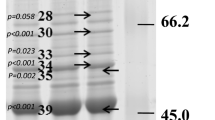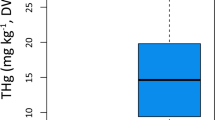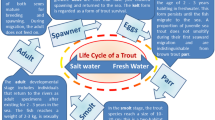Abstract
IN a previous communication, the relative distribution of vitamins between the red muscle and the ordinary muscle in fish was reported1. The relation between the proportion of red muscle present and the activity of different species was pointed out, and the possible function of the red muscle as an organ proposed.
This is a preview of subscription content, access via your institution
Access options
Subscribe to this journal
Receive 51 print issues and online access
$199.00 per year
only $3.90 per issue
Buy this article
- Purchase on Springer Link
- Instant access to full article PDF
Prices may be subject to local taxes which are calculated during checkout
Similar content being viewed by others
References
Brækkan, O. R., Nature, 178, 747 (1956).
“Fishes of the Western North Atlantic. Part 1. Lancelets. Cyclo-stomas. Sharks” (Memoir Sears Foundation of Marine Research, New Haven, 1948).
Wollebæk, A., Norges Fisker, Kristiania (1924).
Dienzeide, R., Novella, M., and Roland, J., Bull. St. d'Agriculture et de Pêche de Castiglione, No. 4, 26 (1952).
Soljan, T., “Ribe Jadrana” (Zagreb, 1948).
Author information
Authors and Affiliations
Rights and permissions
About this article
Cite this article
BRÆKKAN, O. Red Muscle as a Possible Character for the Identification of Sharks. Nature 183, 556–557 (1959). https://doi.org/10.1038/183556b0
Issue Date:
DOI: https://doi.org/10.1038/183556b0
Comments
By submitting a comment you agree to abide by our Terms and Community Guidelines. If you find something abusive or that does not comply with our terms or guidelines please flag it as inappropriate.



